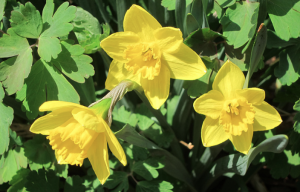Sometimes all it takes is something simple like a warm spell in winter to change our outlook on the world and get us thinking about the future. Such is life in the Bay Area.
 But spring really is just around the corner. Besides, it’s never too early to start thinking about spring plantings and home landscaping plans for the coming year, especially if you plan to put your property on the market.
But spring really is just around the corner. Besides, it’s never too early to start thinking about spring plantings and home landscaping plans for the coming year, especially if you plan to put your property on the market.
The Professional Landcare Network, the national trade association for landscape professionals, offers smart advice for homeowners looking to get a jump on spring. Here’s a quick summary of the organization’s recommendations:
- First, inspect the trees and shrubs in your yard, looking for limbs or branches that might be broken or damaged. Prune them or have them removed by a professional.
- Rake away leaves and other debris from plant beds, prune any dead branches, and create tidy borders around the beds using an edging tool.
- Test the soil every few years to make sure it has the proper pH balance and nutrient mix. Most garden centers sell soil-testing kits if you’re in do-it-yourself mode, or you can consult a lawn-care or landscape professional.
- Depending on the plants in your yard and the soil conditions, you may want to fertilize it, along with trees and shrubs. Check with an expert for the timing and type of fertilizer. When possible, choose slow-release or controlled-release nutrients to prevent runoff and increase absorption.
- Add an inch-thick layer of mulch in plant beds and around trees, but don’t let the mulch touch the tree trunk and never let it accumulate to more than a three-inch depth. Mulch makes planting areas look neat and also helps to retain moisture in the soil. It keeps the roots cool in the summer and insulates them in the winter.
- Check your outdoor lights for broken fixtures. Reset timers when daylight saving time begins on March 8.
If you have questions about pest management at home or in your yard or garden, contact a master gardener with the University of California Cooperative Extension for free “plant doctor” diagnosis and management resources.
(Photo: Flickr/Ali Eminov)
